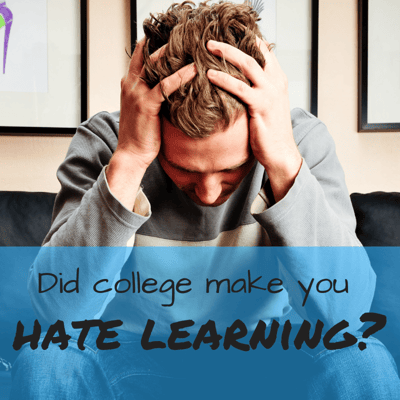 My friend (and Praxis CEO) Isaac Morehouse has a fun little experiment he asks people to do in his book Freedom without Permission.
My friend (and Praxis CEO) Isaac Morehouse has a fun little experiment he asks people to do in his book Freedom without Permission.
In the book he writes “a Google image search for the word [education] results in desks, chalkboards, letter grades, stressed kids, regimentation, classrooms, and kids sleeping or with pained looks on their faces.”
He asks this of people because it’s a good reminder that most of us treat school and education as the same thing.
Picture a world where this wasn’t the case. I like to think Google would show me images of exciting projects people have made, passionate producers, people learning while doing, and people of all ages engaged in the process of self-directed improvement.
When I enrolled in college, I thought it would be like this. Instead, I got a place where students actively tried to avoid learning.
Administrators, parents and the media regularly lob criticism at these students.
Personally, I don’t blame the students at all.
College and school more broadly teach you to hate learning.
It taught you to ask for permission
If you’re in school or you’ve gone through school, you probably remember asking questions like “can I use this source in my essay?” or “is it okay to read this book for the project?”
This is what we at Praxis call the permission-based mindset. It’s the mindset that defaults the responsibility of creative thought and action onto some third-party authority. “They,” you think, “will tell me what is and isn’t okay.”
It’s easy to see why over time this mindset makes learning into something that is not enjoyable.
By the time a student finishes elementary school, he or she has been told “no” to their interests so many times that they start to see “education” as more about checking off boxes and people pleasing than a process of self-interested improvement.
Instead of asking for permission, start asking “what do I want to learn?” Then do it.
It made learning about consumption, not creation.
Think of the last essay you wrote in a college course. Did anyone besides your professor and maybe a peer read it? Would you even want them to?
I can’t even remember anything I wrote in college even though I normally got pretty good grades.
The problem with this current model is that your education is divorced from real-world value creation.
Isaac Morehouse has a good article where he asks the question “Imagine if we taught bicycling like this.” We’d spend years studying bicycle theory, watching other people bike, and maybe very occasionally doing biking simulations for exams.
After graduation, we’d be bad bikers and probably hate biking.
The solution to this is obvious. If you want to enjoy learning, don’t limit yourself to content consumption or artificial creation in the classroom. Write articles, do podcasts, build side projects, products, or services around what you’re learning. Put them out into the real world and let the market judge them for what they are.
You’ll start to see how the process of learning can make life more beautiful, more fulfilling, and how it can create value for yourself and others.
It tied learning to the credential
Imagine two classroom settings. In one classroom setting, you have people who have to be there because it’s a required course for their degree. Let’s say a class is on Ancient Greece. There are engineers, gender studies students, finance majors, journalists, marketers, and of course history people.
Most of them are in that class because it was the only course open for them to meet some departmental requirement. Frankly, most students not only hate the class, but they hate college.
This is what most college classes are like.
Now imagine that same class outside of college. You don’t earn a degree outside of college, so people aren’t there to meet any requirements.
Filling this class are individuals with a genuine interest and passion.
What class do you think would be a better environment?
Students today grow up taking classes that are, for the most part, filled not with people who are passionate about the material, but students who were required to attend.
Why should we excpect them to view learning as something more exciting than a chore?
It taught you to choose between being an intellectual and doing business.
I wrote on the Praxis blog the other day:
“We aren’t against the world of ideas. We don’t recognize a distinction between ideas and practical reality. We don’t think it’s necessary for a young person to choose between a career in business and a career in the arts, sciences, or humanities.”
What I mean by this is that being an intellectual is NOT about pursuing certifications, departmental accolades, and holing yourself up in the “ivory tower.” Today more than ever there are opportunities to be what I call a professional intellectual.
You can write books, create podcasts or videos, give talks and lectures, and build an audience for yourself. You can do it full time or part time.
There is no reason that intellectual projects must limit your entrepreneurial pursuits.
I know marketers who also write books on philosophy. I know entrepreneurs who give talks on Austrian economics. The choice is a false dichotomy — one will reinforce the other.
If you want some advice for moving forward the best thing I can tell you is to do the opposite of what you’ve been taught to do in the learning process.
Stop jumping through hoops. Don’t ask for permission. Stop chasing credentials. Start creating something in the real world now.
March 31, 2017
